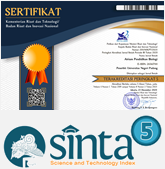Problem-based Learning (PBL) effects through blended learning on collaborative ability of biology students
Abstract
Keywords
Full Text:
FullpaperReferences
Aini, M., Narulita, E., Indrawati. (2020). “Enhancing Creative Thinking and Collaboration Skills through ILC3 Learning Model: A Case Study”. Journal of Southwest Jiaotong University, 55(4).
Al-Fa’izah, Z., Rahayu, Y., & Hikmah, N. (2017). Digital Repository Universitas Jember Digital Repository Universitas Jember. Efektifitas Penyuluhan Gizi Pada Kelompok 1000 HPK Dalam Meningkatkan Pengetahuan Dan Sikap Kesadaran Gizi, 3(3), 69–70.
Ariana. (2018). Pegangan Pembelajaran Berorientasi pada Keterampilan Berpikir Tingkat Tinggi. Jakarta: Dirjend GTK Kemdikbud.
Ayun, Q. (2021). Analisis Tingkat Literasi Digital dan Keterampilan Kolaborasi Siswa dalam Pembelajaran IPA Kelas VII Secara Daring. Jurnal Didaktika Pendidikan Dasar, 5(1), 271–290. https://doi.org/10.26811/didaktika.v5i1.286
Bahri, A., Putriana, D., & Idris, I. S. (2018). Peran PBL dalam Meningkatkan Keterampilan The Role of PBL in Improving Biological Problem Solving Skill. Jurnal Sainsmat, 7(2), 114–124. http://ojs.unm.ac.id/index.php/sainsmat
Fitriyyah, S. J., & Wulandari, T. S. H. (2019). Pengaruh Model Pembelajaran Problem Based Learning Terhadap Berpikir Kritis. Program Studi Pendidikan Biologi UNIROW, 12(1), 1–7.
Hidayati, N. (2019). “Collaboration skill of biology students at Universitas Islam Riau, Indonesia”. International Journal of Scientific and Technology Research, 8(11).
Malinda, Y. N. (2019). Penerapan Model Pembelajaran Problem Based Learning Untuk Meningkatkan Hasil Belajar Peserta Didik Pada Konsep Sistem Ekskresi Kelas Xi Mipa Di Sma Negeri 4 Soppeng. 7(2), 242–247. https://ejournal.unesa.ac.id/index.php/jpak/article/view/30118
Purwanto, A., Pramono, R., Asbari, M., Hyun, Ch., C., Putri, R., S., Wijayanti, L., M., Santoso, P., B. (2020). “Studi Eksploratif Dampak Pandemi COVID-19 Terhadap Proses Pembelajaran Online”. EduPsyCouns: Journal of Education, Psychology and Counseling, 2(1), 1-12.
Rahmawati, A., Fadiawati, N., Diawati, C. (2019). “Analisis Keterampilan Berkolaborasi Siswa SMA Pada Pembelajaran Berbasis Proyek Daur Ulang Minyak Jelantah”. Jurnal Pendidikan Dan Pembelajaran Kimia, 8(2).
Syafii, W., & Vebrianto, R. (2020). Blended Learning and Project Based Learning on Biology Teacher Candidates ’ Creative Thinking in Learning on Biology Learning Innovation Blended Learning dan Project Based Learning Terhadap Berpikir Kreatif Calon guru Biologi Dalam Pembelajaran Biologi.
Triana, D, S, R, dan Anggraito, Y., U. (2019). “Effectiveness Environmental Change Learning Tools Based on STEM-PjBL Towards Students’ Collaboration and Communications Skills”. Journal of Innovative Science Education, 10(37).
Yustina., Halim, L., Mahadi, I. (2020). “The Effect of’ Fish Diversity’ Book in Kampar District on the Learning Motivation and Obstacles of Kampar High School Students through E-learning during the COVID-19 Period”. Journal of Innovation Educational and Cultural Research, 1(1): 7-14.
Yustina, Mahadi, I., Ariska, D., Arnentis, & Darmadi. (2022). The Effect of E-Learning Based on the Problem-Based Learning Model on Students’ Creative Thinking Skills During the Covid-19 Pandemic. International Journal of Instruction, 15(2), 329–348. https://doi.org/10.29333/iji.2022.15219a
Yustina., Apriandi, R. (2022). Buku Referensi: Problem Based Learning (PBL) Berbasis Higher Order Thingking Skill (HOTS) melalui Blended Learning. Jawa Tengah: LAKEISHA.
DOI: http://dx.doi.org/10.24036/apb.v8i2.14739




